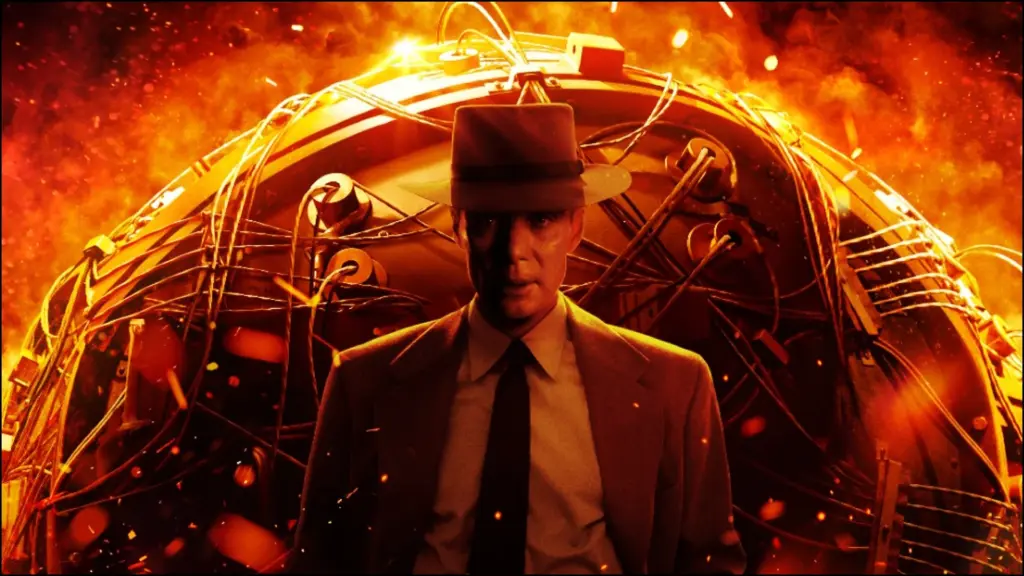I just watched Oppenheimer and I am Oppen-whelmed from three hours looking at Cillian Murphy’s perfect bone structure and crystalline eyes. His version of J. Robert Oppenheimer is a dreamboat of a porkpie-hatted science guy who helps invent a weapon of mass murder, until finally his conscience says “Wait a minute.” (Not like that lumpy, non-weapon-making Albert Einstein, who’s more like a space-time-continuum Santa.)
Oppenheimer‘s three hours are divided into three acts: (1) Young Oppenheimer and his atomic hallucinations; (2) Los Alamos Oppenheimer and his atomic demonstrations; and (3) Persecuted Oppenheimer defending against McCarthyite Machinations.
This means the movie effectively peaks with the explosion (spoiler alert!) of a tower-hung boom-ball in the rain-soaked desert darkness. Writer-director Christopher Nolan‘s movie builds to this climax all along, until Ludwig Göransson‘s furious violinists churn themselves into exhaustion and dead-stops to silence, so you can hear somebody in the audience gasp (if you’re watching in one of many sold-out theaters in 2023 July) as a gaggle of genius-nerds with security clearance watch the blinding mushroom cloud like sunglass-sporting, SPF-million-lotioned Independence Day spectators who wanted fireworks but instead got an angry solar eclipse with a shockwave.

Oppenheimer’s first two hours up to that point had thumped forward with confidence, emboldened by one smart casting coup after another. Here’s Robert Downey Jr. as a key player in Atomic Energy Commission, and Josh Hartnett as a physicist (Ernest Lawrence, to be exact) who builds atom-splitting contraptions (a cyclotron, to be exact), unlike the deep-thinker, theoretical-physicist title character and….hey it’s Kenneth Branagh (Niels Bohr), now we’re getting serious, isn’t he knighted or something? And there’s Rami Malek, playing a physicist who looks like Rami Malek. Then a military character shows up and: we’ve got Matt Damon in the hizzouse (complete with Damon-ready snappy dialogue as the security-strict assembler of the Los Alamos bomb-building team). Could creepy, possibly spy-torturing Casey Affleck be around the corner? How about Gary Oldman….no, you’ll have to wait a while for his turn as an eerily self-satisfied-at-having-bombed-Japan president Harry S. Truman (a considerable feat, given that Oldman recently gave a masterful, much more complimentary performance as Winston Churchill in 2017’s Darkest Hour).
The point being that Oppenheimer’s first couple of hours charge forward unfurling top-notch actors, each dressed to the nines — or 1939s at least — while belting out portentious lines of history-critical significance. There’s no stunt casting, no Bryan “Breaking Bad” Cranston playing Werner Heisenberg (which would be funny, but instead Heisenberg is played the challengingly named Matthias Schweighöfer). Christopher Nolan’s screenplay seems like it’s committed to depicting every key player mentioned in the book that inspired this biopic, American Prometheus by Kai Bird and Martin J. Sherwin.
If you’re a fan of major scientific players of the 20th century (and who isn’t?), you’re in luck because Oppenheimer gets an early start referencing everyone from Einstein to Enrico Fermi, and I quickly lost track of whether scenes took place in the halls of Cambridge, Cal Tech, Berkeley, or Just Some Hallway Full of Mahogany. Nolan hits early symbolic notes with the story of how J. Robert Oppenheimer almost killed a lab teacher with a poison apple. It’s like Eve sampling from the tree of knowledge, prefiguring a natural green earth corrupted by the atomic age and nearly erasing knowledge entirely. Or maybe the apple just symbolizes delicious fruit.
Oppenheimer’s character is quickly established as a pensive polyglot and potent player, not just among academics but among available (and unavailable) women. As a key romantic link — and a link to the Communist sympathies that threaten to undermine him as a public figure later on — Florence Pugh (playing Jean Tatlock) brings much-needed psychological as well as curvilinear dimensions to the film’s square-angled sausage fest. Pugh is followed by Emily Blunt, the complex (okay, she drinks too much) woman who becomes Oppenheimer’s wife. (It’s a good thing Blunt’s not in a sequel to A Quiet Place, because her dissatisfied-at-being-reduced-to-a-housewife character is prone to letting her Oppen-baby cry from neglect.)

Piling historical details, Oppenheimer illuminates the sense of far-flung scientists, with their distant mutual respect and camraderie, evolving from an ad-hoc group to a power-player status they’d never known before. The movie also makes clear the extent to which Nazi Germany’s anti-Semitism put America at the advantageous end of the European brain drain. Bad move, Hitler, and your mustache looks stupid too.
I waited anxiously for physicist Richard Feynman to show up sporting his bongos (as he memorably recounts in the classic book Surely You’re Joking, Mr. Feynman!), and Oppenheimer does not disappoint, treating us to two bongos sightings if not Feynman’s impish charm (it’s not actor Jack Quaid‘s fault; the character simply remains on the sidelines). Florence Pugh’s bongos are also a high point, but that’s another story. Percussives aside, Oppenheimer starts feeling like it requires Cliffs Notes, and I lost track of the 30-or-so characters’ names, their impact on the proceedings, and even which blokes are which (for one example, glasses-wearing characters played by Dane DeHaan and Christopher Denham blur together in the movie’s speedy edits).
Are there movie theaters that have an option for subtitles? Because to these ears, the dialogue sound-mix often was barely audible. It seemed as though Ludwig Göransson himself sneaked into the editing room to crank up the soundtrack, as if sparking a Cold War between people who love mumbling and audiophiles who strive to go deaf.
Further complicating matters is Nolan’s insistence on bouncing among timelines, as he did in Dunkirk (2017). Perhaps we should be grateful that scenes don’t flow backwards (ala his other films Memento and Tenet). To be charitable, perhaps Nolan’s narrative flow here is cleverly designed to demonstrate the paradox between particles and waves. I wouldn’t put it past him.
After the Trinity test bomb drops, in 1945, the terrifying Hiroshima and Nagasaki bombs quickly follow, but Nolan tactfully avoids imagery of their devastation. Instead he stages a powerfully expressive scene somewhat reminiscent of the oblique, artful ending of Insignificance (1986). In this dreamlike interlude, Oppenheimer addresses a small auditorium representing the public at large, who deliriously applaud the destruction while their skin peels away. Some suddenly fall into despair or animalistic orgy, and Cillian Murphy’s Oppenheimer, ever wide-eyed and halting, envisions charred human remains at his feet. Though the scene abruptly derails from the narrative, it somehow makes perfect sense.
The movie could have ended there, but that’s the two-thirds mark. Nolan isn’t done with us.
What’s less compelling is that, after building so much tension around the impact (literal and figurative) of the atomic bomb, the movie’s third act pulls back its focus to the man’s public reputation. It’s like worrying about a paper cut after sustaining a compound fracture: After grappling with the possibility of the world ending, one man’s personal legacy seems trivial. Nolan seems to be saying, “Enough about the death of humankind, let’s talk about the unfair revocation of security clearance.” Visually the movie regresses too, retreating from vistas of New Mexico to the drab walls of the claustrophobic room (a kangaroo non-court) where Jason Clarke grills characters about whether they’re current or former card-carrying Communists, and if the former, did they burn the card, rip it up, or feed it to ducks?
The movie goes deep into the scorched-earth weeds regarding the complicated, often internecine relationships between scientists Hans Bethe (Gustaf Skarsgård), Edward Teller (walking gloom-bomb Benny Safdie), and Klaus Fuchs (Denham) — who turns out to be an actual Russian spy, an espionage sub-plot on which Nolan fails to capitalize. Nor does he effectively dramatize the palace intrigue when Lewis Strauss (Downey Jr.), of the Atomic Energy Commission, tries to leverage the security hearings into a later successful bid for a Cabinet position. Oppenheimer, whose misgivings about atomic bombs seem quaint compared to his overwhelming anxiety about hydrogen bombs (which are a thousand times more powerful), goes from king of the mountain to someone in way over his head. Sure, it’s all fascinating, but cinematically it’s like cruising along on a bicycle and suddenly plodding through wet concrete.
It does make a great double feature: First you go to the theater, then you go home for a hot night reading Wikipedia. I’ll recommend you start here, read it all, click all the links, and read those too. Nolan’s movies, with their obsessive zeal, often create an intoxicating hyper-reality. Oppenheimer might be the biggest of all his films, but this fantastic machine’s gears eventually grind themselves down.
[Read another take on Oppenheimer with this alternative Screenopolis review.]














